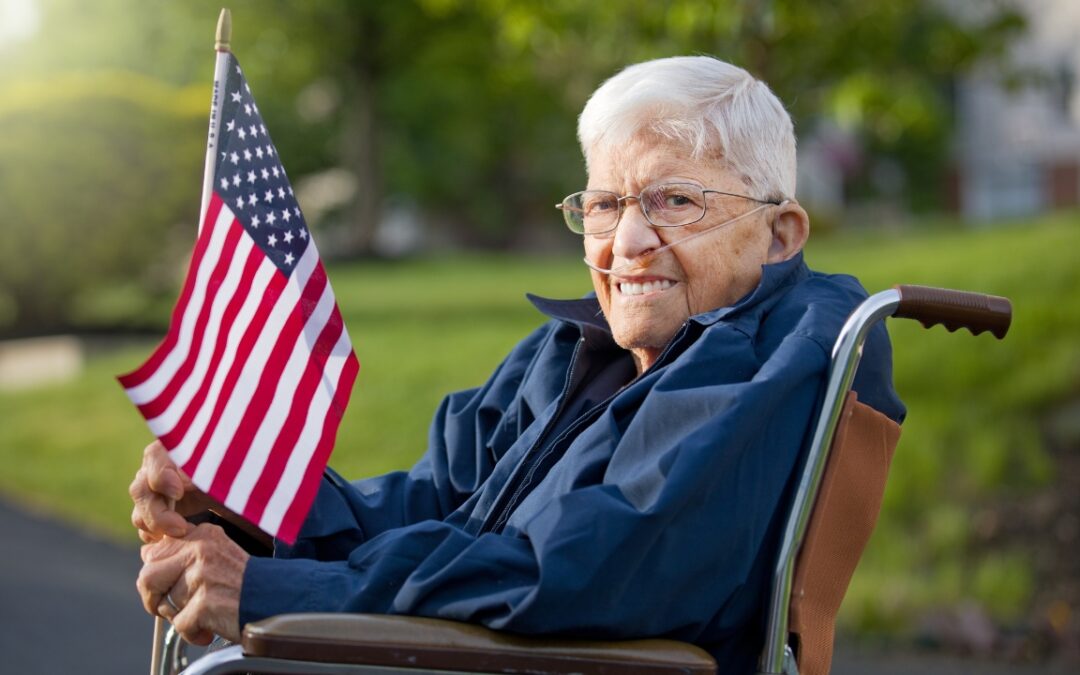Veterans are one of our most underserved populations in terms of care. Some find it difficult to navigate the care system in place for veterans, especially those who are on their own. Others aren’t even aware of the support available to them. There are even some veterans who mistakenly believe asking for help makes them a burden on others, so they go out of their way to try to handle things on their own.
These individuals have served our country honorably, some for years, and they deserve to be helped and cared for. Due to their unique needs, this isn’t always easy, but that doesn’t mean it shouldn’t be done or that veterans should accept low-quality care. Let’s take a look at the care challenges veterans often face, what support is out there for them, and how Reliant Home Care Services can help care for the veterans in your life.
Understanding the Needs of Veterans
While many people have unique health challenges, veterans often face a combination of physical, mental, and emotional challenges that come from seeing combat or engaging in military operations. These challenges can include PTSD, loss of mobility or limbs, and exposure to chemicals that have serious effects on the body.
These conditions aren’t always apparent, either. In fact, some only become obvious when the veteran returns to civilian life. They realize that without the structured military life they’ve lived, they no longer know what to do. They may find it difficult to fit in at a new job or feel as those their lives no longer have any clear goal or purpose. This can lead to depression or even suicidal thoughts. Disabled veterans can be especially vulnerable to these feelings if they are unable to work.
Unfortunately, many healthcare providers who are not trained in assisting veterans fail to take these unique needs into account. They may treat physical ailments but fail to fully understand PTSD. Others may apply the same forms of care that they would use with any patient who is struggling with depression. While some of those forms of care may help, they often don’t address circumstances that affect veterans. Because of their unique history and needs, veterans need tailored support.

Healthcare and Medical Support for Veterans
There are a number of healthcare services aimed at veterans. The U.S. Department of Veterans Affairs, of course, is the most well-known of these resources. While the VA does offer many different services aimed at treating challenges many vets face, including PTSD, depression, substance abuse, and more, the system is not always easy to navigate. In addition to the federal VA system, each state also has a Department of Veteran Services or similarly named agency. This is another great source of care and support for veterans.
If your loved one is a veteran who is in need of support, the VA or your local state veteran’s agency may be the first place you start looking, but it doesn’t have to be your last. There are many other agencies out there that specialize in care for veterans. There are some therapists and other mental health experts who focus on treating veterans. Reliant is here to help you find the right mental health support for your loved one, whether it’s for PTSD, depression, or any other complex health condition.
As with all types of home care and healthcare, finding the right fit for your loved one is key. You want to make certain the professionals you’re working with, whether they’re physicians, therapists, psychologists, or home care providers, understand veterans and what they’re going through. Otherwise, they may not be able to provide the best quality care possible.
Employment and Career Assistance
After leaving the military, some veterans do fully retire. Some are unable to work, while others are old enough they are able to live off their pension and other retirement accounts. However, many veterans do look for employment after leaving the service. Finding the right type of job, however, is often difficult. After seeing what they’ve seen in combat situations, it can be very difficult to find any sort of “normal” job fulfilling.
Fortunately, there are programs out there that assist veterans with finding jobs or volunteer opportunities that fit with their goals and abilities. There are also educational opportunities that can help veterans learn new skills that they will need in their civilian careers. One organization to start with is the Military Officer’s Association of America. This group strives to protect veterans’ benefits while also helping them transition to civilian life.
While it will be a major change, returning to civilian life is possible. The U.S. Department of Labor estimates that around 200,000 service personnel transition to civilian employment every year. Many do so with the help of the department’s Transition Assistance Program, which provides education and other resources.
Housing and Homelessness Support
In addition to healthcare and employment challenges, many veterans also face housing challenges. In fact, a study done by the Bob Woodruff Foundation found that housing insecurity was one of the biggest challenges veterans faced. The study found that almost 8 percent of the homeless population were veterans, and another 13 percent were struggling with poverty. Rising rent and mortgage rates, plus the fallout of the COVID-19 pandemic, have only made veteran unemployment and housing security worse.
Fortunately, there are programs out there to help veterans. The VA offers special interest rates and programs that can help veterans achieve their goals of homeownership. Other programs, such as the Homeless Providers Grant and Per Diem program, help homeless veterans by providing funds to agencies across the country. Support Services for Veteran Families (SSVF) is another VA program that helps veterans with housing.
These programs can help many veterans no matter what their situation. For example, one veteran found himself homeless first after a divorce, then later following an illness. The SSVF program helped him find housing once he recovered.

Mental Health and PTSD Support
Mental health support is vital for veterans facing PTSD and other mental health concerns. These issues have to be treated alongside physical health challenges. The VA does provide mental health services, but with its limited resources, veterans often have to find counseling and therapists elsewhere. Unfortunately, it’s not always easy to find other providers who fully understand what veterans are going through.
One of the biggest challenges to veterans’ mental health often comes from veterans themselves. There’s a stigma about mental health that prevents many people from seeking help, but it seems especially prevalent amount veterans. Many find the idea of therapy unnecessary. They believe it won’t help or that it’s not something they need. They don’t seek out mental health assistance or flat-out refuse it when it’s offered. This is why, beyond providing mental health services, we need to focus on destigmatizing mental health treatment. Whether it’s for a veteran or not, no one should ever feel like seeking therapy or other mental healthcare is embarrassing or somehow wrong.
Fortunately, there are many success stories for veterans who have received mental healthcare. Some overcame anxiety and stress, while others overcame addiction or fear. By working with professionals who understand veterans’ needs, it’s possible for your loved one to find the peace and clarity necessary to reassimilate to civilian life and find that life fulfilling.
Community Engagement and Support
When in the military, veterans have a built-in support system. They are with their unit, sometimes more than with their families, and there’s a special bond between them and their fellow servicemen and women. However, once they leave the military, they may not immediately find another community. It can take some time before they can build a new community, and it’s not always easy.
Fortunately, there are things veterans can do to become a part of their community. This includes volunteering, joining various organizations, and taking part in hobbies. There are even opportunities to work with organizations that help military members and veterans. The United Service Organizations is always looking for veterans to assist in preparing care packages for active service members, so it’s a great way for vets to support the military. The Wounded Warrior Project is another great organization that helps those who have been injured.
Another organization that helps veterans and is always in need of volunteers is the VA Center for Development and Civic Engagement. They are always looking for people to help, whether you’re a veteran or not. While they do offer practical programs such as transporting veterans to doctor’s appointments, they also offer social programs aimed at simply keeping veterans company. Their Compassionate Contact Corps visits socially isolated vets, and that’s something many veterans may be interested in.
Financial Assistance and Benefits
Many vets are on a fixed income, so they and their families are understandably stressed out overpaying for any type of medication or treatment. Fortunately, even if you’re on a fixed budget, there are resources out there to help you pay for treatment. Some programs offer treatment at a cost based on your income, while others may provide free treatment to those who qualify.
There are many different benefits available to veterans, including disability compensation and various pension programs. However, you and your loved one may not necessarily be aware of all of the financial assistance out there. Filling out the forms or going through the application process can also be stressful.
That’s where working with someone who fully understands how the VA and other programs work can be incredibly beneficial. There are legal support services available to help veterans through the process and to help them determine which financial programs they should apply for. Some programs will also help you find financial support. For example, Reliant will help you understand what financial assistance is available for your loved one so you don’t have to worry about stretching your budget to the breaking point.

Recognizing and Honoring Veterans
Many businesses offer a discount for veterans as a way of thanking them for their service. This does more than simply help them out financially—it’s good for their mental well-being. It shows the vet that people do appreciate what they’ve done and that what they’ve been through was worth it. There was a reason they served, and sometimes being reminded of that while checking out at a store is all it takes to make a vet feel a little better.
This is also why Veterans Day is so important. It’s a day to celebrate, recognize, and honor our veterans. To some, it may not seem like much more than a holiday that doesn’t affect them, but to a veteran, it can be everything. While it may not help them with their nightmares or help pay for treatment, it does have an effect on their mental well-being.
If you see a veteran, thank them for their service. It only takes a few seconds, but it can make their day, especially if they’re having a very bad one. It reminds them of why they served and can, if only just for a little while, make the burden they’re carrying a little lighter.
Why Tailored Veteran Care Plans Matter More Than Ever in 2025?
One of the biggest care challenges facing veterans today isn’t just access—it’s personalization. As of 2025, there’s growing awareness that a “one-size-fits-all” model doesn’t work for our nation’s heroes. Veterans come from diverse backgrounds, with unique service experiences, and often face highly individualized health concerns. Whether it’s chronic pain from past injuries, navigating PTSD in civilian life, or needing specialized home care assistance, generic services can leave critical gaps in support.
That’s where customized care planning, like what Reliant Home Care Services offers, truly makes a difference. Instead of applying cookie-cutter solutions, Reliant builds veteran-specific care plans that factor in not just physical needs, but also emotional and social well-being. Think of it like building a home—you wouldn’t use someone else’s blueprint for your dream house, right? The same idea applies to long-term care for veterans. Reliant works directly with families and veteran support networks to design plans that actually make sense for the individual, ensuring they’re not lost in the system but supported by it.
Helping Veterans Navigate the Maze of Support in 2025
Let’s be real—navigating the VA can feel like being dropped in the middle of a bureaucratic jungle with no map. That’s why so many veterans either give up trying or miss out on critical benefits they’ve earned. In fact, a 2024 survey by the Iraq and Afghanistan Veterans of America (IAVA) found that nearly 32% of veterans weren’t aware of half the services available to them, including mental health care and VA-backed home care options.
Reliant Home Care Services now offers VA navigation assistance as part of its comprehensive veteran care program. This means helping vets cut through red tape, connect with local veteran service officers, and find benefits like Aid & Attendance that can help cover the cost of in-home care. It’s not just about healthcare—it’s about building a sustainable, stress-free life after service. Because let’s face it: veterans didn’t fight for our country just to come home and battle paperwork.
If someone you love is struggling to get the support they deserve, don’t let them fall through the cracks. With veteran-tailored care, compassionate guidance, and expert support from services like Reliant, there’s finally a clear path forward.
Veterans Are an Underappreciated and Underserved Population
Our veterans have given much to this country, and they deserve to be taken care of and supported. The fact that they are an underserved population is a failing of society, but it doesn’t have to stay that way. By providing the mental, physical, and emotional care our veterans need, we can help them feel appreciated and live their lives to the fullest.
What can you do to help? Get involved. If you have a loved one who is a veteran, there are groups you can join to help promote their well-being and care. If you’re a veteran, there are organizations out there for you. Even if you’re neither, you can still volunteer, make donations, and vote for those who support veteran care.
If the veteran in your life needs home care, Reliant is here to help. We have worked with many veterans, and we understand their needs. Whether it’s help with daily tasks or the occasional visit while you take a break, we’re here for you. Reach out to Reliant today to learn more.



